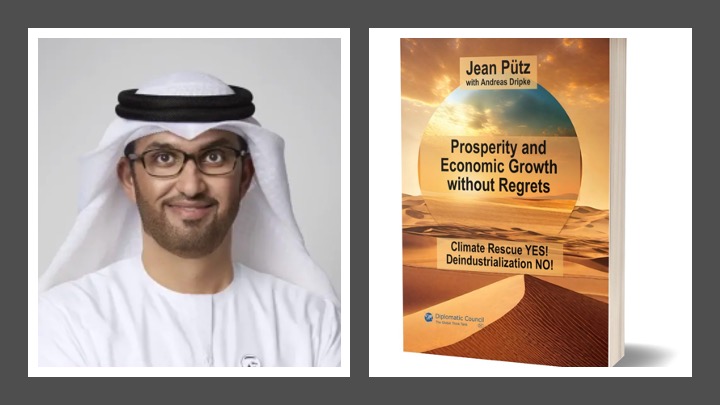Thought Leadership

„At COP21 in 2015, the world agreed to limit global warming to 1.5°C compared to pre-industrial levels by 2050. To remain on target, science tells us that emissions must be halved by 2030. We only have another seven years to meet that goal. COP28 UAE is a prime opportunity to rethink, reboot, and refocus the climate agenda“, says H.E. Dr. Sultan Ahmed Al Jaber, President-Designate for COP28 UAE. The facts: The United Arab Emirates (UAE), this year's host country of the UN Climate Change Conference, is the third largest exporter of crude oil and the seventh largest exporter of natural gas. The UAE has pledged to cover half of its own electricity needs with renewable energies by 2050. Nevertheless, it will remain a major producer and exporter of fossil fuels for the foreseeable future.
This is the starting point for science journalist Jean Pütz, who will present the English edition of his latest book on a global methanol economy at COP28. It is entitled "Prosperity and Economic Growth without Regrets: Climate Rescue yes - Deindustrialization no" (ISBN 978-3-98674-104-4; Diplomatic Council Publishing).
In the run-up to COP28, the author points out that in 2022, the share of fossil fuels in global primary energy consumption was over 80 percent - the highest share since 2013. According to calculations, in order to achieve the target set by the International Energy Agency - reducing greenhouse gases to net zero by 2050 - the share of fossil fuels in global primary energy consumption would have to be halved to 40 percent by then.
The core thesis of the new book is that green methanol is best suited to replacing fossil fuels as the world's energy source. To this end, methanol production should take place in sunny regions around the equator. The solar energy required for production is available in abundance there. As methanol is liquid at normal temperatures, it could be transported using the existing infrastructure that is currently used for crude oil: Pipelines, tankers and tanker trucks through to delivery at the filling station in the form of e-fuels. How the production process and global distribution could work is described in detail in the book presented internationally at COP28.
Further information about the new book: https://www.amazon.de/Prosperity-Economic-Growth-without-Regrets/dp/3986741046/
